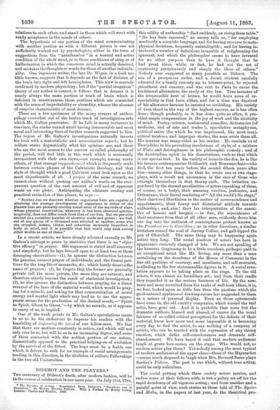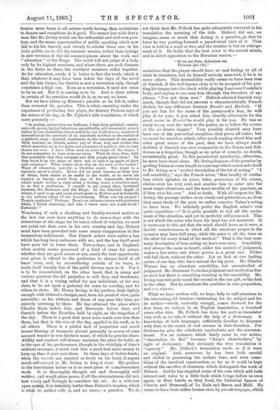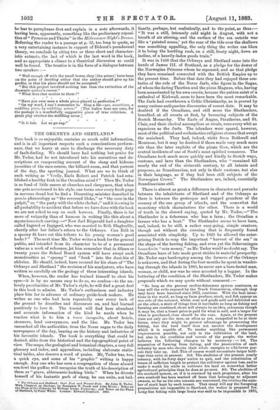DIDEROT AND THE PLAYERS.*
THE centenary of Diderot's death, after modern fashion, will be in the course of celebration in one more year. On July 31st, 1784, • The Paradox of At-Hag. Translated from Didernt's " Paradoxe our le Com6dien." By Water Berries Pollock. With a Preface by Henry Irving. London ; Chatto and Whidus. 1883. this oddity of authorship " died suddenly, on rising from table." "He has been censured," an enemy tells us, "for employing needlessly a scientific language, and for having recourse to meta- physical doctrines, frequently unintelligible ; and for having in- troduced a number of definitions incapable of enlightening the ignorant, and which the philosopher seems to have invented for no other purpose than to have it thought that he had great ideas, while, in fact, he had not the art of expressing perspicuously and simply the ideas of others." Nobody ever suggested so many parallels as Diderot. The son of a prosperous cutler, and a Jesuit student carefully educated for a family canonry up to tonsure-point, he rejected priesthood and canonry, and was sent to Paris. to ensue the traditional alternative, the study of the law. True instance of the irrepressible bent of letter s, he would have none of re- spectability in that form either, and for a time was deprived of his allowance because he insisted on scribbling. His variety of turn stood in the way of the highest success, as it has often done ; though probably, as it has done quite as often, it pro- vided ample compensation in the joy of work and the elasticity of mind. Poetry, science, sentimental comedies, dictionaries (of medicine, and of arts and trades !), speculative metaphysics, political satire (for which he was imprisoned, like most men), critical treatises, and improper stories, the man wrote them all. His manner was many-sided as his matter. He reminds us of Thucydides in his provoking involutions of style, of a mixture of Plato and Aristophanes in his philosophic comedy ; and of the Aristotelian spirit in his dissertations, such as that which is our special text. In his variety of irons-in-the-fire, he is like his famous contemporaries Goldsmith and Beaumarchais—who died, the first ten years before, the second fifteen years after him—among other things, in that he wrote one or two stage- plays, with a result not uncommon in the case of those who entangle themselves in that thorny path. The irritation en- gendered by the eternal peculiarities of actors (speaking of them, of course, as a body), their amazing vanities, jealousies, and littlenesses, their literal rendering of " All the world's the stage," their chartered libertinism in the matter of correspondence and appointments, their funny and dictatorial attitude towards authorship ; and, alas ! their lax interpretation of the sancti- ties of honour and bargain — in fine, the separateness of their existence from that of all other men, evidently drove him one day into the outburst of contemptuous protest known as the Parculave ear is Comedien ; as in other directions, a similar irritation roused the soul of Jeremy Collier, and gall-tipped the pen of Churchill. The same thing may be happening again before very long. The social position of actors has been in appearance curiously changed of late. We are not speaking of the honours (beginning to be a little overdone, peihaps) paid to an exceptional artist like Mr. Irving, any more than a man moralising on the decadence of the House of Commons in the fine old qualities of courtesy, and manliness, and self-restraint, is alluding to the few statesmanlike figures in it. A social revo- lution appears to be taking place on the stage. To the old actors, it was almost an hereditary art; and from their cradle they regarded it as the serious business of life. By the new, more and more recruited from the ranks of well-born idlers, it is, we fear, looked upon as little less than the pastime which the good-natured applause of drawing-rooms has suggested to them as a means of personal display. Even as these ephemerals have come in, the old country companies, which nursed the real actor, have gone out. And it is probable that none but the dramatic authors, blamed and abused, of coarse (in the usual fairness of so-called critical perception) for the defects of their material, know how more and more impossible it is becoming every day to find the artist, to say nothing of a company of artists, who can be trusted with the expression of any strong emotion, which defies self-consciousness and demands self- abandonment. We have heard it said that modern audiences laugh at grave love-scenes on the stage. Who would not, as modern actors play them P Yet nobody among the most typical of modern audiences of the upper class—those of the Haymarket —seems much disposed to laugh when Mrs. Bernard Beere plays Sardou's Fedora. The part is one which, without true acting, could be only ridiculous.
The social petting which these society actors receive, and endow some of their fellows with, is but a paltry set-off for the rapid decadence of all vigorous acting ; and from another and a painful point of view, such stories as those told of The Squire and Moths, in the papers of last year, do the theatrical pro-
fession more harm in all esteem worth having, than invitations to dances and receptions do it good. We cannot but wish that a man like Mr. Irving would use his influential and well-won posi- tion, and the many opportunities of public speaking which now fall to his lot, bravely and sternly to rebuke these sins in his body politic (as he did the amateur mania), rather than indulge in new versions of the old common-places about the work and " education " of the Stage. The world will not judge of a body only by its highest members, and where there are such diseases in the limbs as these, the worthiest members suffer together. As for education, surely it is better to face the truth, which is that, whatever it may have been before the days of the novel and the late dinner, the theatre is now a recreation only, though sometimes a high one. Even as a recreation, it need not cease to be an art. But it is ceasing so to be. And a stern reform in certain of its practices would do it, as an art, no harm.
But we have taken up Diderot's parable as he left it, rather than reviewed his paradox. This is what, smarting under the experience of producing two plays, the literary Proteus says of the actors of his day, in Mr. Pollock's able translation, of which more presently :-
" In society, unless they are buffoons, I find them polished, caustic, and cold, proud, light of behaviour, spendthrifts, self-interested ; struck rather by our absurdities than touched by our misfortunes ; masters of themselves at the Ppectado of an untoward incident or the recital of a pathetic story ; isolated, vagabonds, at the command of the great ; little conduct, no friends, scarce any of those holy and tender ties which associate us in the pains and pleasures of another, who in turn shares our own. I have often seen an actor laugh off the stage ; I do not remember to have seen one weep. What do they, then, with this sensibility that they arrogate and that people grant them ? Do they leave it on the stage at their exit, to take it up again at their next entrance ? What makes them slip on the sock or the baskin ? Want of education, poverty, a libertine spirit. The stage is a resource, never a choice. Never did an actor become so from love of virtue, from desire to be useful to the world, or to serve his country or family, never from any of the honourable motives which might incline a right mind, a feeling heart, a sensitive soul, to so fine a profession. I myself; in my young days, hesitated between the Sorbonne and the Stage. In the bitterest depth of winter, I used to go and recite aloud parts in Moliere and in Corneille in the solitary alleys of the Luxembourg. What was my project ? To gain applause ? 'Perhaps. To mix on intimate terms with actresses whom I found charming, and who I knew were not strait-laced ? Certainly !"
Wondering if such a shocking and frankly-avowed motive as the last can ever have anything to do now-a-days with the attractions of the stage for its latest school of votaries, we need not point out that, even in his own country and day, Diderot must have been provoked into some angry exaggeration in this tremendous indictment. But French actors were under a ban which has long been unknown with us ; and the ban itself must have gone far to lower them. Now-a-days, and in England, when society seems possessed of a kind of craze for actors, whether they are good actors or not, surely the best opportunity ever given is offered to the profession to cleanse itself of all baser taint, and, by reconsidering certain of its ways, to make itself frankly free of the guild thrown open to it. For it is to be remembered, on the other hand, that in many and various quarters the old prejudice is still deep and inveterate, and that it is a trying ordeal for any individual, or for any class, to be set upon a pedestal for some to worship, and for others to stone. Mr. Henry Irving, in his preface, deals lightly enough with Diderot's charges, and, from his point of view, quite naturally ; as his withers, and those of any man like him, are entirely unwrung by them. He has attained the place which Charles Kean before him, and Macready before that, and Garrick before the Kembles, held by right, as the tragedian of the day. There is a good deal more noise made over him than them, but that is the vice of the day, applied to his craft, as to all others. There is a pitiful lack of proportion and much insane blowing of trumpets abroad generally (a source of some amused wonder to non-hysteric man), of which he gets his share. Ability and conduct will always maintain the place he holds, as in the case of his predecessors, though in the whirligig of time's satirical revenges, it must cost him a good deal more money to keep up than it ever cost them. In these days of butter-feasts, when the vessels are emptied so freely on his head, it argues much self-control in Mr. Irving to keep it clear. His preface to the translation before us is no mere piece of camplementary work. It is thoroughly thought out and thoroughly well written, and would atone prove, if all the circumstances did not, how wisely rindlovingly he considers his art. As a criticism upon acting, it is infinitely better than Diderot's treatise, which is what its author calls it and no more,—a paradox. We do
not think that Mr. Pollock has quite adequately conveyed in his translation the meaning of the title. Diderot did not, we imagine, mean so much that Acting is a paradox„as that he knew he was putting forward a paradoxical view of it. That view is told in a word or two, and the treatise is but an enlarge- ment of it. He holds that the best actor is the merest mimic, and in direct opposition to the Horatian maxim,— " Si via me flare, dolendum eat
Primum ipsi tibi,"
maintains that the player should have no real feeling at all of what he simulates, but be himself entirely unmoved, if he is to move others. This insensibility really seems to have been true of Garrick, if the well-known story is to be accepted of his put- ting his tongue into his cheek while playing Lear over Cordelia's body, and saying to one near him through the, thunders of ap- plause, " I've got them now." Diderot admired Garrick very much, though that did not prevent a characteristically French disdain for any difference between Hamlet and Macbeth. "If you ask him for the scene of the paatrycook's boy, he will play it for you ; if you asked him directly afterwards for the great scene in Hamlet he would play it for you. He was as ready to cry over the tarts in the gutter, as to follow the course of the air-drawn dagger." Very possibly Garrick may have been one of the proverbial exceptions that prove all rules ; but we must for ourselves admit, after much reading about him and other great actors of the past, that we have always much doubted if Garrick was ever comparable to the Keane and Sid, douses as a tragedian, though as an actor of comedy, no doubt, exceptionally great. In this paradoxical peculiarity, otherwise, he must have stood alone. Mr. Irving disposes of the paradox by quoting Telma at some length in a passage which commends itself to Mr. Irving as a " perfect description of the art of acting." "I call sensibility," says the French actor, "that faculty of exalta- tion which agitates an actor, takes possession of his senses shakes even his very soul, and enables him to enter into the most tragic situations, and the most terrible of the passions, as if they were his own." And so forth. With all respect for Mr. Irving, the passage strikes us as windy and pretentious, as, from that same study of the past, we rather conceive Talma's acting to have been. We infinitely prefer the English actor's own quiet exposition :—" It is quite possible to feel all the excite- ment of the situation, and yet be perfectly self-possessed. This is art which the actor who loses his head has not mastered. It is necessary to this art that the mind should have, as it were, a double consciousness, in which .all the emotions proper to the occasion may have full sway, while the actor is all the time on the alert for every detail of his method." That is the best sum- mary description of true acting we have ever seen. Sensibility (not always the same as heart), under the control of judgment, makes a fine actor, and where genius is, a great one. Either will fall short, without the other. Let us look .at two leading actors of our day, who have missed the big prize. Mr. Charles Warner has an abundant sensibility, but uncontrolled of judgment. Mr. Hermann Vezin has judgment and method as fine as steel, but there is something wanting in the sensibility. Mr. Irving may not quite equal the second in the one gift, or the first in the other. But he combines the qualities in rare proportion, and ecce eignum.
Wbat we have written will, we hope, help to call attention to the interesting old treatise—interesting for its subject and for its author—which, curiously enough, comes forward for the first time, we believe, in an English translation, a hundred years after date. Mr. Pollock has done his part as translator very well, as we take it without the help of a dictionary. A knowledge of both languages sufficiently familiar to dispense with that, is the secret of real success in that direction. For dictionaries give the scholastic equivalents, not the conversa- tional. For an instance, which lately came to our notice, " chambellan du Roi" becomes " King's chamberlain," by right of dictionary. But obviously the true translation is "equerry." Mr. Pollock's translation reads as if it were an original. ' And, moreover, he has been both careful and skilful in preserving the archaic tone, and even some- thing of the involved construction, so far as it could be kept. without the sacrifice of clearness, which distinguish the work of Diderot. And he has supplied notes of his own which add both interest and value to a little book which brings before us once again, in their habits as they lived, the historical figures of Clairon and Dumesnil, of Le Kain and Baron and Mole. He seems to have been rather beaten once, by parade tragique, which he has to paraphrase first and explain in a note afterwards, it having been, apparently, something like the preliminary exposi- tion of " Pyramus and Thisbe" in the Midsummer Night's Dream.
Referring the reader to a passage at p. 32, too long to quote, as a very entertaining instance in support of Diderot's paradoxical theory, we conclude by citing two or three short and character- istic extracts, the last of which is the last word in the book, and as appropriate a climax to a theatrical discussion as could well be found. The treatise is in the form of a dialogue between two speakers :-
" Well enough off with the small boxes, they [the actors] have been on the point of deciding either that the author should give up his profits, or that his piece should not be accepted."
"But this project involved nothing less than the extinction of the dramatic author's career."
" What does that matter to them ?"
"Have you ever seen a whole piece played to perfection ?"
"On my word, I can't remember its Stop a bit—yes, sometimes, a eniddling piece, by middling actors." [The italics here are ours, for the passage is a wonderfully suggestive piece of true criticism. A great play crushes the middling actor.]
"It is late. Let us go sup."




































 Previous page
Previous page